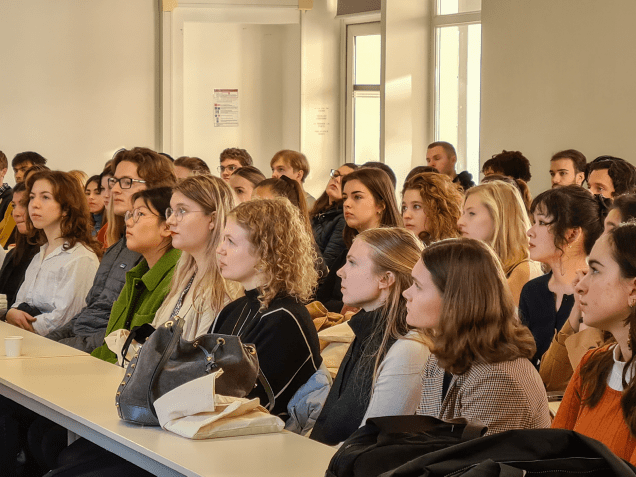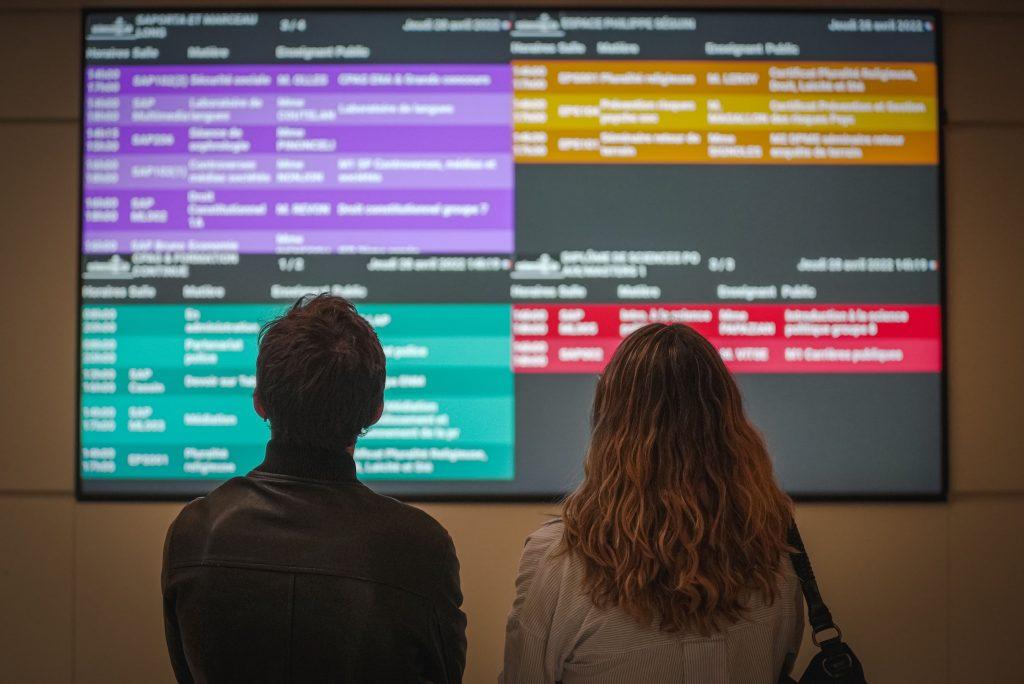Courses

International students benefit from multidisciplinary courses at Sciences Po Aix: International Relations, Political Science, Economics, History, Law, Journalism and Communication, Sociology, Religion and Society, Foreign Languages, French classes and courses taught in English, Spanish, French and German.
The lists of courses (semester 1, semester 2 and courses in English) are available here. Click on the course title to consult the corresponding syllabus.
Students may choose from among the various courses in accordance with the requirements of their programme and their home university.
Sciences Po Aix recognises and applies the European Credit Transfer System (ECTS). The procedures for validating the mobility year are set out in the study regulations. A full-time academic semester represents a volume of 30 ECTS credits, a year 60 ECTS. The seminars are worth 5 ECTS, the lectures 4 ECTS.
Lectures courses and seminars
Teaching at Sciences Po Aix takes the form of two complementary course formats, namely lectures in an amphitheatre which bring together all the students following a common course, and seminars which, in small groups, allow students to deepen the theoretical bases studied in class as well as their language level. Attendance at seminars and language classes is compulsory and monitored. Three absences, even if justified, will result in a mark of zero.
Timetable

The online timetable confirms the holding of a course, as well as information on the day, time, room, etc. It is therefore essential to consult it regularly in order to be informed of any changes, at the following address: planning.sciencespo-aix.fr (connect using the login and password appearing on the certificate of enrolment that the student receives after finalising his/her administrative enrolment).
Semester 1
- Course list S1 2025-2026 International students
Course syllabi
There might be some syllabi in the list below that are not taught this semester. Please make sure that the course is available by checking the course catalogue above.
- Culture et Société en France I – niveau FLE 4 ou 5 conseillé
- Cities, conflict and Development (temporary title)
- Dissecting the law of European Union through the landmark cases of its court of justice
- La France dans le Monde I
- France in a global context– prerequisite : knowledge of international relations
- History of International Relations I
- Les territoires français face à la mondialisation
- Géographie humaine : Les Territoires français face à la mondialisation
- La Vie Politique Française (Compulsory for CEP)
-
- Civilisation Française I
- Français langue étrangère I (niveau 1)
- Français langue étrangère I (niveau 2)
- Français langue étrangère I (niveau 3)
- Français langue étrangère I (niveau 4)
- Français langue étrangère I (niveau 5)
- Foreign languages (English, German, Arabic, Chinese, Spanish, Italian, Japanese, Russian) *
- French Phonétique (min B1 level)
- La France au 20ème Siècle
- Techniques de production orale et écrite – niveau FLE 2-3
- Techniques de production orale et écrite – niveaux FLE 4-5
- Art oratoire
- Contestations et technique de mobilisation
- Droit administratif
- Droit des relations internationales
- Economie de l’entreprise
- Géopolitique de la Méditerranée
- Histoire des idées politiques I
- Histoire de la Russie contemporaine (depuis la fin du XIXe siècle)
- Histoire des Relations Internationales
- Histoire des idées Politiques I
- Institutions et Vie Politiques Comparées I
- Institutions de l’Union Européenne
- Introduction à la Turquie contemporaine
- Macroéconomie en économie ouverte
- Médias et société
- Le Sahel en crise
- Seminar Analyse quantitative des données
- Seminar Economie et Management
- Seminar Gouverner et contester
- African-American Music History
- Contemporary China
- Financial globalization and financial crises
- Gender and Politics
- Historia Socio Politics of Spain and Latin America
- Politics and society in central and Eastern Europe
- Theories and politics of European integration
- The Camus Investigation: Bridging Past & Present
- Action publique et participation
- Analyse comptable et financière
- Anthropologie des conflits récents
- Art, politique et opinion publique
- Cadre normatif des Relations Internationales
- Conflits et défis des relations internationales
- Droit Civil
- Droit de la fonction publique
- Droit de l’Union Européenne
- Droit pénal
- Dynamiques religieuses transnationales
- Écrire une chronique culturelle pour le web/radio
- Enjeux numériques de l’information
- État et autorité en Europe
- Filmer le politique
- Finances publiques I
- Fondamentaux de la science politique
- Francophonie : acteurs, dynamiques, défis
- Gouverner l’islam en Méditerranée
- Histoires des politiques culturelles patrimoniales
- Intégration économique européenne
- Les politiques publiques I
- Macroéconomie financière internationale
- Macroéconomie et transition climatique
- Méthodologie de la recherche et enquête de terrain
- Méthodologie statistique appliquée et Big Data
- Module informatique
- ONG, lobbys et think tanks dans le processus européen
- Philosophie politique
- Politiques Economiques I
- Politiques culturelles locales
- Politiques culturelles à l’international
- Politiques publiques en Europe
- Politiques Urbaines et Mondialisation
- Police et régulation
- Politique et religion
- Projet culturel
- Pouvoir et religion
- Questions européennes
- Questions sociales
- Représentations culturelles des conflits
- Science politique de l’Union Européenne
- Services publics
- Sociologie politique de l’international
- Sociologie politique des controverses
- Stratégie ESG (Environmental, Social and Governance)
- Théorie de la firme
- Violences et sortie de violence à l’international *
- External relations of the European Union
- Geopolitics of South Asia
- Colonization and Economic Development
- Contemporary Visual culture Seminar
- Painting and phenomena : a seminar on art criticism
- Spirituality, philosophy and science
- The EU’s role in the fight against money laundering and corruption
- Web application design (online course)
- External Relations of the EU
- The use of force in International Law: Old problems and contemporary practice
- Social reactions to migrations and idealogies of Security
Semester 2
- List of courses S2 2025-26 International students
Course syllabi
There might be some syllabi in the list below that are not taught this semester. Please make sure that the course is available by checking the course catalogue above.
- American Foreign Policy
- Culture et société en France II – niveau FLE 4 ou 5 conseillé
- EU’s policies against corruption – prerequisite: knowledge of European law
- French Foreign Policy
- Globalization and Identity
- History of International Relations II
- La France dans le Monde II (Compulsory CEP)
- Civilisation Française II
- Français langue étrangère I (niveau 1)
- Français langue étrangère II (niveau 2)
- Français langue étrangère II (niveau 3)
- Français langue étrangère II (niveau 4)
- Francais langue étrangère II (niveau 5A)
- Francais langue étrangère II (niveau 5B)
- Foreign Languages (English, German, Arabic, Chinese, Spanish, Italian, Japanese, Russian)
- La France au 20ème siècle
- Techniques de Production orale et écrite en français intermédiaire II
- Techniques de Production orale et écrite en français avancé II
- Action publique
- Cinéma et politique
- Droit administratif
- Ethique et politique
- Finance soutenable
- Histoire des idées politiques II
- Histoire des Relations Internationales II
- Institutions et Vie Politique Comparées II
- Introduction à la transformation digitale et à la 4ème révolution industrielle
- Politique, économie, société en Chine contemporaine
- Questions sociales
- Règlement du cRéglement du conflit Conflit israélo-palestinien
- Relations Internationales
- Régimes Politiques et Sociétés
- Sport et société
- Enjeux géopolitiques en Corée
- Gouverner, Contester
- Droit administratif
- Economie et Management
- Phonétique
- Cinematic Adapatations: Literature on Screen
- Human Rights in Eastern Countries
- Islam and Globalization
- Language, Power and Society in the English-speaking world
- Shaping global power: The British empire, from America, Asia and Africa to Brexit
- Violence and Politics
- Comparative Human Rights Law
- Comparative politics
- Fundamentals and Policies for a Greener Economy
- Action publique appliquée
- L’agencification des politiques européennes
- Analyse comptable et financière
- Colonisations et Sociétés coloniales au 19ème siècle
- Controverses, médias et sociétés
- Controverses, médias et sociétés
- Débat sur le journalisme contemporain
- Droit administratif approfondi II
- Droit civil
- Droit international des affaires
- Droit public économique
- Elements fondamentaux des questions sociales
- Espace public et action collective
- Finances Publiques II
- Fondamentaux du marketing
- Géopolitique
- Grands principes du droit de l’environnement
- Guerres et conflits au XXème siècle
- Histoire des mondialisations contemporaines
- Image, discours et représentations sociales
- La France et les conflits en Afrique depuis 1960
- L’Europe et sa construction politique au prisme des religions et de la sécularisation
- Les politiques publiques II
- Marchés financiers internationaux
- Mesure des performances et pilotage des organisations
- Politiques Economiques II
- Politique étrangère de la France
- Sociétés et Régimes politiques en Europe du Sud
- Sociétés et Régimes politiques du Monde Arabe et musulman
- Sociologie des organisations politiques et partisanes
- Sociologie de la communication
- Souveraineté et relations internationales
- Comparative Politics
- European Business Law and Strategies of the Firm
- Feminist Political Thought
- Fighting Economic Crime in the EU’s external relations
- History of the Mediterranean system
- America Latina – del poder oligarquico hasta las dictaduras militares
- America latina en movimiento
- L’arte e l’impegno
- Web application Design
Evaluations
Sciences Po Aix recognises and applies the European Credit Transfer System (ECTS). The procedures for validating the mobility year are set out in the study regulations.
Students are graded on a scale of 0 to 20 points, for more information see the table here (link to pdf Table Grading).
A learning agreement drawn up in advance guarantees the recognition of the ERASMUS mobility for the student’s studies, subject to passing the exams.
Attendance at examinations
Attendance at examinations is compulsory. If the student is absent from an examination for which he/she is registered or if he/she does not hand in the required work, the subject will appear on his/her transcript with 0 credits. The mention “justified absence” on the transcript is granted only for illness, serious family reasons etc. upon presentation of an official document. “Unjustified absence” appears for any other absence. To validate a subject and obtain credits, the student must obtain a mark of 10/20. Any absence or mark below 10 entitles the student to a make-up examination in June. Each course is validated individually. There is no compensation between courses or between semesters. Under certain conditions, “jury points” may be awarded. The “jury points” allow a course to be validated without having to take a make-up examination.
Examination sessions
They take place at the end of the semester and last two weeks:
– Autumn semester: December
– Spring semester: May
– Make-up exams: remotely in June (semester 1) and July (semester 2)
Examination procedures
The examination procedure for lectures vary according to the course:
– Oral exam: 10, 15 or 20 minutes preparation and 10, 15 or 20 minutes oral questioning
– Written exam of 1, 2 or 3 hours (a three-hour exam is obligatory for the CEP required courses)
– 1 hour written exam
For the seminars: continuous assessment, no final exam during the examination sessions.
Transcript of records
At the end of each study period, an official transcript of grades including validated subjects and credits is sent directly to the partner universities. Students can download their results from the university’s Digital Workspace (ENT).
A full-time university semester represents a volume of 30 ECTS credits, a year 60 ECTS. The seminars are worth 5 ECTS, the lectures 4 ECTS.
Academic calendar

For more information on semester dates, course periods, and holidays, please consult the academic calendar here.